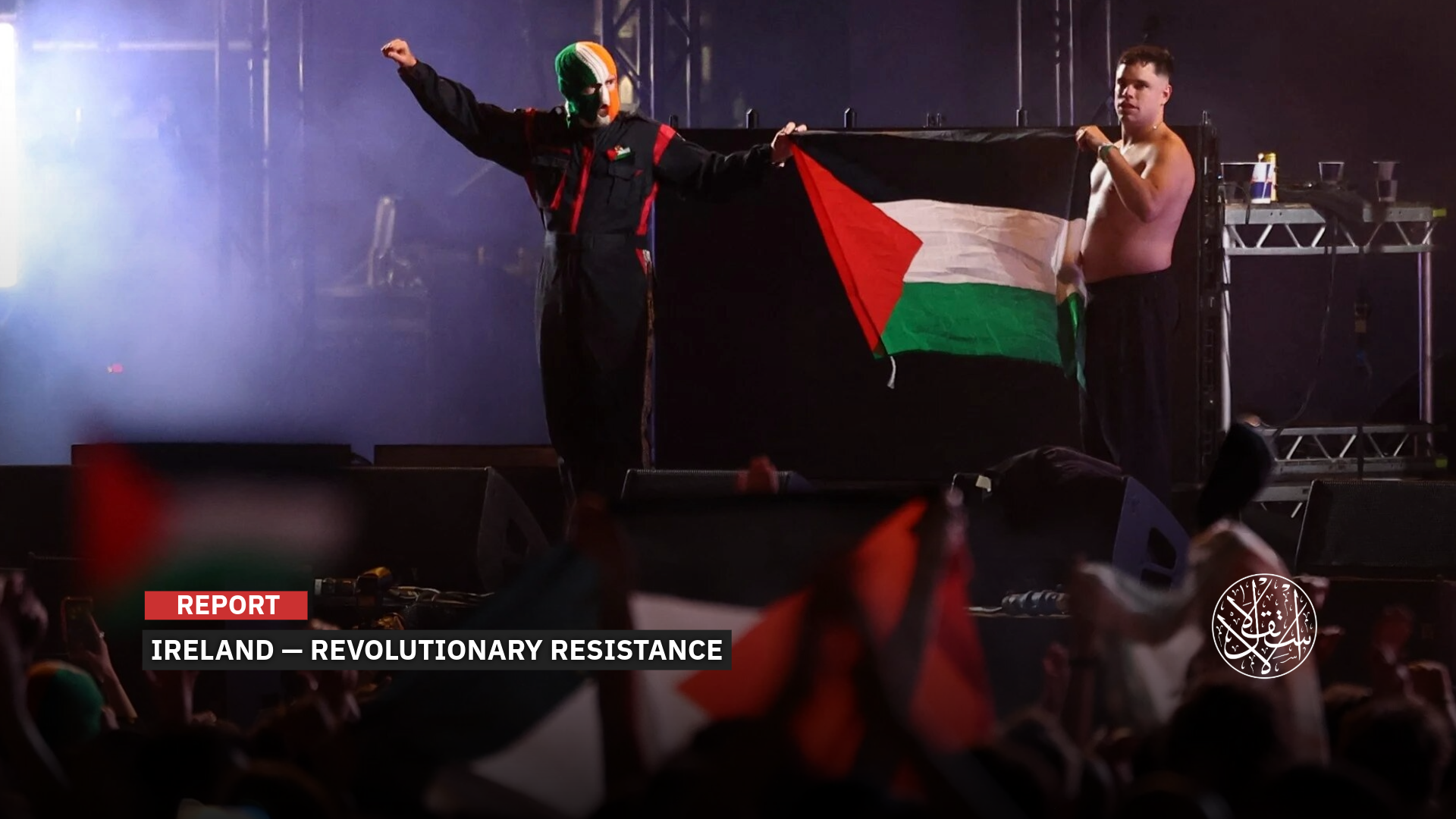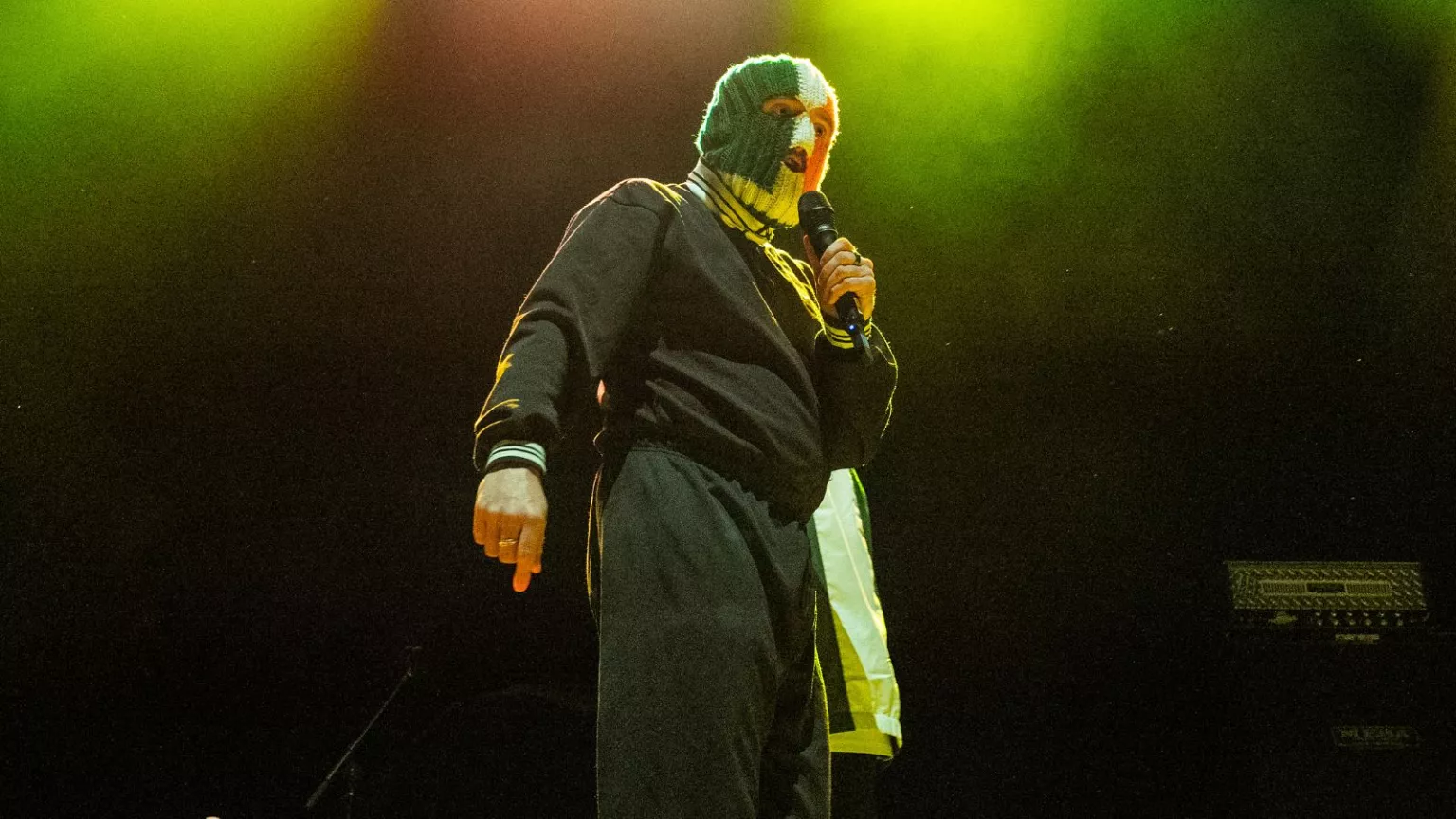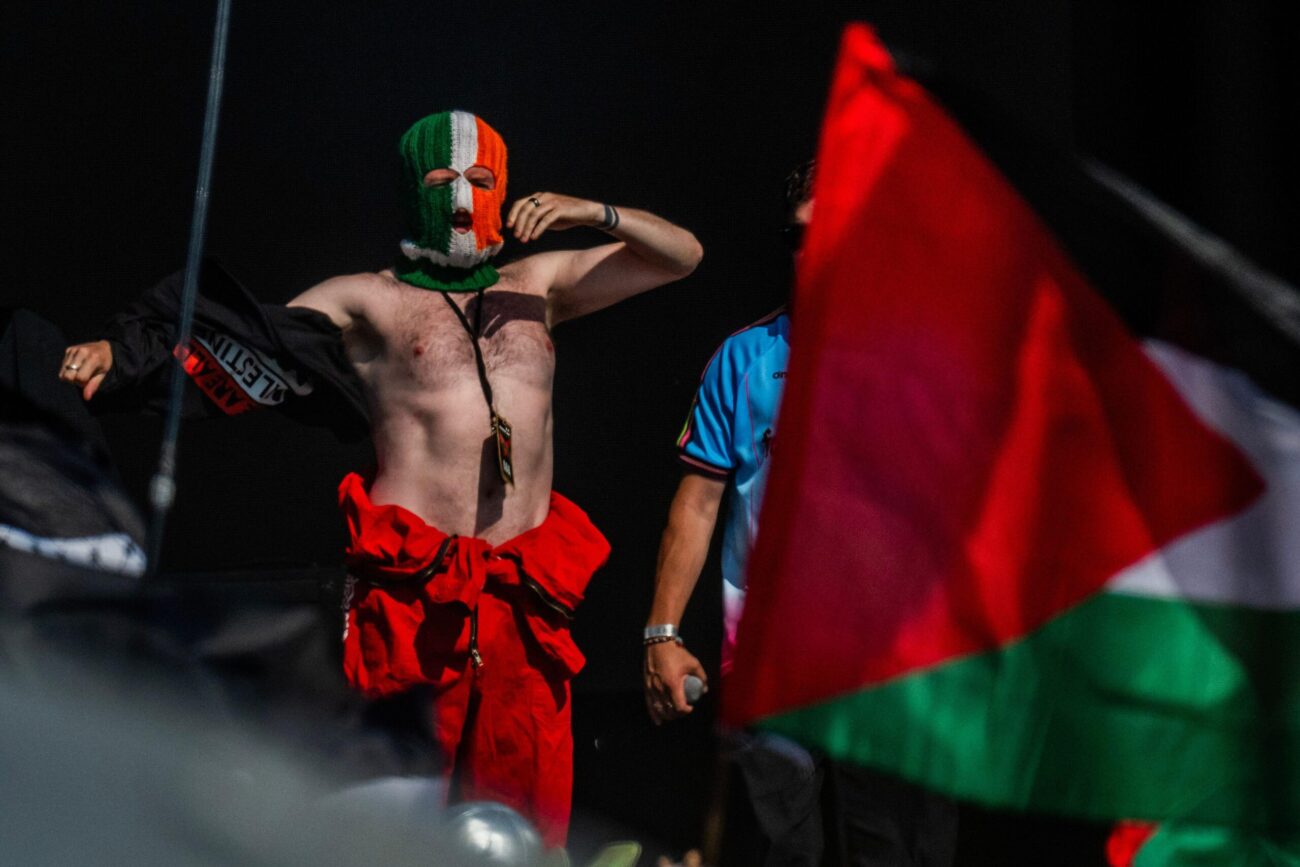Kneecap: An Artistic Force Turned Revolutionary Voice, Boldly Condemning Gaza Genocide from the Streets of Ireland

Kneecap is regarded not merely as a musical group, but as a cultural movement that revitalizes Irish resistance.
As the world stands silent, or blatantly complicit, before the massacres in Gaza, a rebellious hip-hop band from the streets of Belfast has risen to break the silence, unleashing a defiant cry from international festival stages: “Israel is committing genocide against the Palestinian people.”
Kneecap, an Irish hip-hop group known for their sharp political lyrics in their native tongue and their fearless confrontations with British authorities, has now taken their message further, singing today for Palestine from behind Gaza’s siege.
They condemn “Israel” without restraint, calling it by the name many hesitate to speak aloud: a colonial entity committing war crimes.
At Poland’s OFF Festival in early August 2025, before an international audience, Kneecap used their artistic platform to declare that the war in Gaza did not begin on October 7, and that Palestinians are dying today of hunger after being bombed from the air, and are being shot at while searching for a scrap of bread or a sack of flour.
The band did not stop at mourning, placing the blame squarely on the West, reminding Europe, still grappling with the legacy of its colonial past, that silence is complicity.
A Revolutionary Voice
In one of the most striking displays of global cultural solidarity with the Palestinian people, Kneecap dedicated their performance at the OFF Festival to delivering a clear and powerful message against the genocide faced by Gaza’s residents, affirming their unwavering support for Palestinians in the face of occupation and aggression.
Amid the raucous beats and revolutionary rhythms, a band member addressed the crowd, acknowledging that speaking of such a tragedy while singing and dancing “may seem contradictory,” but insisted that “silence is no longer an option.”
He added that the war in Gaza is the continuation of decades of colonialism and systematic oppression endured by Palestinians, painfully echoing Ireland’s own history under British colonial rule.
The band insisted that the tragic reality in Gaza cannot be ignored, calling on everyone with a conscience to stand openly with the oppressed.
In a clear gesture of appreciation, Kneecap praised young people in Ireland, Poland, and around the world who have come to understand the truth of what is happening in Palestine, rejecting the dominant Zionist narrative and refusing to remain neutral, noting that their youthful audience has grown more aware and courageous in opposing silence and complicity.
They closed their message by pledging to continue using their artistic platform, both inside and outside Ireland, to condemn the genocide committed by “Israel” and to support the Palestinian struggle, insisting that art must be a tool of resistance, not merely a form of entertainment.
The History of Kneecap
Kneecap’s stance on the Palestinian cause was neither sudden nor born of fleeting sympathy.
Instead, it is an organic extension of their political and cultural roots, deeply embedded in Ireland’s long struggle against British colonialism, and shaped by their collective awareness of their country’s history of occupation, racial discrimination, and cultural erasure.
Formed in 2027 and based in Belfast, the cultural and political capital of Northern Ireland, the band hails from a city that for decades was the epicenter of Irish resistance to British rule, home to revolutionary nationalist movements such as the Irish Republican Army (IRA).
It is from this environment that Kneecap emerged, carrying an artistic message charged with identity, defiant language, and a clear rejection o
As a result, Kneecap is often regarded not simply as a musical act, but as a cultural protest movement that revives the spirit of Irish resistance and reshapes it through the modern language of hip-hop.
Music, for the group, is a tool of confrontation against marginalization, racism, and oppressive systems.
In that light, it is perhaps unsurprising that the band has taken an unflinching and, to some in Western circles, unsettling stand in support of Palestinian rights, opposing what it describes as Israeli settler colonialism.
In their statements, songs, and appearances at international festivals, members of Kneecap drew direct parallels between the Palestinian Nakba and Ireland's experience of partition, political oppression, and cultural repression.
They state openly that they view “Israel” as a colonial project, one that mirrors the British occupation that weighed heavily on Ireland for centuries.
This perspective has led to intense media criticism of the group in the UK, particularly after they described “Israel” as a state that commits war crimes against Palestinians and called for its complete boycott.

Kneecap and Hungary
Since Kneecap began raising their voice loudly in support of Palestine, their stance has not come without consequences.
The band quickly became the target of escalating campaigns of vilification in the “pro-Israel” British media, as well as Zionist lobbying groups across Europe and the United States.
They were accused of “spreading hatred,” “inciting violence,” and “anti-Semitism”, familiar charges frequently deployed to silence voices advocating for Palestinian rights.
The campaign reached its peak during Kneecap’s performance at the renowned Glastonbury Festival in the UK, when the band’s frontman, Mo Chara, explicitly described “Israel” as “a regime committing war crimes against a besieged and starving people.”
The statement, met with widespread applause from the audience, sparked angry backlash from right-wing British media outlets and “pro-Israel” organizations, who called for the band to be banned from performing on any public cultural platform again.
Kneecap also found themselves at the center of a growing political and legal storm across Europe, after the Hungarian government, a close ally of “Israel”, imposed a three-year ban on the three band members entering the country.
The decision, announced on 25 July 2025, came just days before the band was due to perform at a major music festival in Hungary.
However, the government swiftly moved to block them, citing allegations of “antisemitism and promoting terrorism,” according to a statement from government spokesperson Zoltan Kovacs posted on X.
Kovacs argued that giving a platform to a band like Kneecap amounted to “normalizing hatred and terrorism,” adding that the decision was part of the state’s “responsibility to protect the Jewish community in the country.”
These remarks reveal a direct political exploitation of the oft-invoked charge of “antisemitism” to suppress voices critical of “Israel”.
Yet Kneecap, known for their distinctive fusion of English and Irish in revolutionary rap lyrics, refused to remain silent.
In a strongly worded statement released via their social media accounts, the band denounced the ban as a “political scandal devoid of any legal basis,” accusing Viktor Orban’s government of “authoritarianism” and an attempt to silence voices exposing the ongoing genocide against the Palestinian people.

Simultaneous Escalation
These measures form part of a wider, coordinated crackdown targeting the band across Europe.
Liam Og O hAnnaidh, known by his stage name Mo Chara, faces criminal charges in a British court on 20 August 2025.
The case stems from his raising of a Hezbollah flag during one of the band’s London performances in 2024, an act deemed a “terrorist offense” by the authorities.
Although the band members have repeatedly denied any organizational ties to Hezbollah and insisted the flag was raised as a “political expression of solidarity against Israeli aggression,” the charges against them reflect an increasingly repressive European climate toward any form of anti-Zionist expression, even when voiced by independent artists.
Despite mounting pressure, Kneecap have stood firm in their convictions. On the contrary, they have amplified their messages of solidarity with the Palestinian people, insisting they will not be silenced in the face of genocide, and that music should be used to expose injustice, not to gloss over it.
“Anti-police sentiment has been longstanding in the hip-hop community,” Moglai Bap says. “This isn’t new. We didn’t burn a police Land Rover, we painted one. Some people are more worried about a piece of art than the effigies of real politicians hanging off bonfires. We don’t want to be fighting or advocating violence. We want people to be thinking.”
Meanwhile, the band has garnered broad support among a growing youth audience across Europe, increasingly vocal in their open opposition to Zionism, particularly within social justice movements, Boycott, Divestment and Sanctions (BDS) campaigns, and student unions.
Palestinian activists and supporters of the cause have praised the band’s moral stance, arguing that voices like Kneecap’s are today more effective than statements from complicit governments or silent international organizations.
As global cultural solidarity with Palestine grows, Kneecap is transforming from a mere musical group into an iconic symbol of resistance, linking the struggles of colonized peoples and redefining art as a battleground for political engagement rather than a space for entertainment.
The Art of Resistance
Egyptian art critic Abdelrahman el-Sharqawi told Al-Estiklal that the Irish band Kneecap has “slapped the silence of Arab artists and defended Palestine on their behalf.”
“Today, the Irish band represents one of the most prominent faces of global resistance art, having taken up the banner of defending the Palestinian cause against the brutal war on Gaza. They have stood firm despite the cost, bans, threats, and repression, proving that art can be a noble weapon against oppression and occupation,” he added.
El-Sharqawi went on to say that as Kneecap faces bans and vilification across multiple European countries, they demonstrate to the world that they are an unbreakable voice. “They have paid the price for their stance in the name of humanity and justice, at a time when Arab art has largely retreated from this historic role it once led, even under authoritarian regimes.”
He pointed to the painful reality of the complete absence of Arab festivals and artistic events supporting Palestine, especially in Egypt, which for decades was a cradle of Arab resistance art and a cultural hub that carried the nation’s causes onto the stage, the cinema screen, and through song. This absence today, he argued, reflects a profound moral and artistic collapse.
El-Sharqawi sharply criticized what he called “artistic farce” in some capitals, asking: “How can we understand the Riyadh season, sponsored by Turki al-Sheikh, taking place amid a genocidal war in Gaza without a single mention of Palestine or Gaza? How is the Palestinian flag banned while products subject to boycott, drinks and food, are imported and openly promoted for all to see?”
He viewed what unfolds under the banner of “entertainment” in these seasons as a betrayal of the collective conscience of the nation, a stain of shame that time will not erase.
“Art is not just for joy; it is a civilizational message that expresses the feelings of peoples. In moments of massacres and disasters, artificial happiness becomes a grave betrayal, and dancing on the ruins of slaughter is an unforgivable act.”
“While prominent Arab artists remain silent or are preoccupied with concerts and festivals, free artists from the West, such as Kneecap and other performers, stand up and say: ‘We are human beings above all else.’ These are the truly free artists, not because they have a platform, but because they refuse to compromise their humanity,” he concluded.











